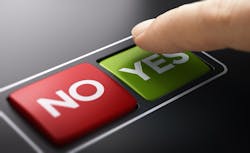If you buy a smart phone, you'll have your choice of an iPhone or an Android. If you need a service provider, your choices usually come down to AT&T or Verizon. If you need ride home after a night out you may choose between Uber and Lyft.
We live in a highly binary world, with options that range among Lowes and Home Depot, or Walmart and Target. These binary options are not absolute; in any particular location there may be additional options for your spending, but the principle holds pretty well, and fairly constantly. And it's not a mystery why this is so: in situations that involve thousands or millions of people making choices over and over again, there is efficiency in making sure that choice is between this or that, number one or number two. You may be shopping for a half a dozen different drill bits, but your first selection is where you will buy them.
The efficiency applies to both the consumer (you) and the supplier. Part of this pattern is simple economics: Investors do not see the value in sponsoring more than one competitor to the market leader, so alternative suppliers generally are start-ups or innovators. That explains the frequency of new online retailing options for highly focused product lines. Their goal is to break through your decision-making process when you shop for clothes or glasses or wine, or some other item that you feel demands more attention than standard suppliers seem to offer. They promise a better product or a better selection, or better service within the niche they have chosen. These alternatives may do very well, but their challenge to the big retailer with the big box store is only on one type of product, not the whole enterprise. The binary dynamic still holds.
But another, more revealing explanation for why we live in this bind is that multiple choices make our lives harder than we would like them to be. We might try different pizza toppings, but soon enough we settle in on our favorite. It makes ordering simpler. It reduces the chances of disappointment. And simplifying our options promotes harmony in the home or community that we share – which is a sort of added-value to the retail experience. Everyone agrees the pizza should not have anchovies, so everyone is happy, or at least satisfied that the choices have been limited.
This dimension of the binary grip reveals something in human nature that wants certainty. It precedes the market-oriented civilization we live in now, and seems to have contributed to the millennium-long development that led to global economics.
It's no accident that commercial activity was replicated in civilian government, successfully and satisfactorily. The American political process (two organizing parties, bicameral legislatures) has paralleled the commercial environment for more than two centuries, not because "money talks" or some other cynical dismissal of our customs but because free markets allow free people to express their demands, and also allows innovators to propose alternatives. If someone has a better proposal or idea, there is a way to present that to the population, to consider it and perhaps adopt it.
But commerce is changing, and it's changing us. Established businesses and government bodies want the freedom that usually accrues to innovators, and they do not want the responsibility of maintaining stable institutions that tend to problems according to standard norms. The first offers growth potential, while the latter is time-consuming and expensive.
Our choices as customers and citizens frequently devolve to "the best available" option, not because the system is flawed but because the participants have decided that delivering uncertainty will be more expedient to their own objective than building toward a consensus. We become dissatisfied customers and reactionary citizens.
If all this were only about choosing smart phones or drill bits or pizza it would not matter too much. But we have a civilization to maintain — to preserve against violence and poverty and disease. None of us has any more than two choices, really, and making the better choice ought to be clearer.
About the Author
Robert Brooks
Content Director
Robert Brooks has been a business-to-business reporter, writer, editor, and columnist for more than 20 years, specializing in the primary metal and basic manufacturing industries. His work has covered a wide range of topics, including process technology, resource development, material selection, product design, workforce development, and industrial market strategies, among others.
